- Home
- Linwood Barclay
The Twenty-Three 3 (Promise Falls) Page 7
The Twenty-Three 3 (Promise Falls) Read online
Page 7
No one waited up for you when you went to college.
When she came out of the stairwell at the second floor, it hit her right away.
The smell.
“Jesus,” she said aloud.
It got much stronger as she headed down the hall, and by the time she reached the door of Lorraine Plummer’s room, she had pulled her jacket over the lower half of her face.
She banged on the door. “Lorraine? Lorraine Plummer? It’s security! Joyce Pilgrim. We spoke a couple of weeks ago.”
No reply.
“No no no no,” Joyce whispered to herself, and reached into her pocket for the collection of keys designed to get her into any room on the entire campus.
As she looked down to insert the key into the lock, she saw, peeking out from under the bottom of the door, the edge of a puddle of something dark, almost oil-like.
Joyce turned the key and pushed the door open.
It took everything she had not to scream. Screaming, she told herself, was not becoming of a security chief.
Shouldn’t have come back. Shouldn’t have come back.
EIGHT
DAVID hit the brakes hard out front of the Pickens home, leaving a short strip of rubber on the street. He got out of the car and ran to the front door, not bothering to knock or ring the bell.
“Marla!” he shouted.
“David!” she called back. He followed her voice to the kitchen, but he didn’t immediately see her. Matthew was strapped into his high chair over by the table, twisting himself around to try to see what was going on.
David came around the island, which had blocked his view of Gill Pickens, as well as Marla, who was kneeling over him. Gill lay on his side, eyes closed, a small puddle of vomit on the floor next to his head.
“Let me see him,” David said, edging Marla out of the way. He kept Gill on his side to avoid any risks of choking, and placed his head sideways on the man’s back.
“What are you doing?” Marla asked.
“Shh!”
He held his own breath while he listened.
He sat up. “He’s not dead. There’s a faint heartbeat. We have to get him to the hospital.”
“I called three times for an ambulance,” Marla said.
“Gill!” David said. “Can you hear me at all? We need to get you out of here!”
A barely perceptible moan. David wasn’t sure, even with Marla’s help, that he could get his uncle all the way down to the street to his car. He took in the sliding glass doors that led from the kitchen to the stone patio. He was pretty sure he could drag Gill as far as that.
“Is it a heart attack? He’s in good shape! He works out.”
“It may be the water,” David said.
“What?”
“Didn’t you hear what I said on the phone? The water may be poisoned.”
Her eyes, already red from crying, went wide with fear. She looked over to Matthew in his chair. “Oh my God. Oh my God.” She put a hand to her mouth. “I gave him his bottle. The formula, it’s mixed with water from the tap.”
But Matthew, at least so far, was showing no ill effects. He wasn’t crying, wasn’t throwing up.
To be on the safe side, though, David thought the baby should go to the hospital, too.
“I’ll be back in a second,” he told Marla. “Unlock those doors.”
He ran from the house, down to the street, and got behind the wheel of his car. He steered it up the driveway, then veered onto the grass and drove the car down between the Pickens house and the one next to it, flattening blades of grass, putting ruts in the sod along the way.
Once past the house, he turned hard left and brought the car right onto the flagstone patio.
Marla had the sliding doors open, Matthew now in her arms. David leapt from the car, opened a back door, then ran into the kitchen and dropped onto his haunches by Gill’s head. He got his arms under Gill’s and slowly lifted him to the point where David was standing, and his uncle stretched out in front of him. He dragged the man out of the kitchen, eased himself into the back of the car first, pulling Gill in with him as he shifted across the rear seat. David opened the door on the other side to get out.
“Come on,” David said to Marla, who exited the house, not bothering to close the doors, and got into the passenger seat, clutching Matthew, gently touching his head to her shoulder.
“What will happen to him?” she asked as David turned the car around on the patio and drove back down between the houses.
He didn’t look her way, but he was pretty sure she was talking about her baby and not her father.
“When did you give him his bottle?” he asked.
“In the last hour.”
“He seems fine.”
“I—I don’t know. I mean, he seems okay.”
David, first of all, didn’t know for sure the water was to blame. But assuming it was, he had no idea how long it took for symptoms to develop once it had been consumed. Everyone seemed to be getting sick this morning.
“When did you make it up?” David asked, glancing in the mirror for any signs of life from Gill as he sped toward the hospital. He had a bad feeling that even once they got Gill there, he might not get the attention he needed in time. But where else was he to go? He knew off-duty medical staff would be getting called in, that more help would be at Promise Falls General than even a few minutes ago.
“Make up what?” Marla asked. “Don’t you believe me? You don’t think my father’s sick?”
Marla had become so accustomed to people questioning her honesty, and sanity, that she’d misheard the question. “When did you make up the bottles of formula?” David asked, taking a second to look at her.
“Oh,” she said, shifting Matthew from one shoulder to the other. “It was . . . it was yesterday. In the afternoon? I think it was the afternoon. I made up half a dozen bottles.”
“Not today.”
She shook her head.
“Not this morning,” David pressed.
“No! It was yesterday.”
“Okay,” he said. “What about you? Have you had any water this morning?”
More thinking. “I haven’t even brushed my teeth yet.” She craned her head around and said to her father, “Dad? Can you hear me? I love you.”
“I need you to do something for me,” David said, handing Marla his cell phone. “Call up the recents.”
She took the phone, looked at the screen. “Okay,” she said.
“See the one that says Sam? Call that number.”
“Who’s he?”
“Just call it. Whoever answers, tell them not to drink the water. It might be a woman. It might be a boy.”
Marla made the call, put the phone to her ear. “It’s ringing,” she said.
David’s grip on the steering wheel tightened while he waited. “Still ringing,” she said. “That’s eight rings.”
“Are you sure you touched the right number?”
“Sam. Yes. That’s the one. Ten rings. Who is this guy?”
“It’s not a guy,” he said. He took one hand off the wheel, ran it over the top of his head, pulling on his hair at the same time, trying to release the tension any way he could. He put the hand back on the wheel.
“Twelve rings. Wait. It’s going to message.”
“Never mind,” he said. David had already sent a text. He couldn’t see the sense, right now, of a voice mail. All Sam would have to do was look at her phone to see she’d missed several calls from him. “You can hang up.”
Marla ended the call and was about to return the phone when it started to ring in her hand. It startled her and she let out a short scream.
“Is it Sam?” David asked.
“I don’t think—hello? No, no, you have the right number. This is David’s phone. He’s driving. This is Marla.” She said to David, “Someone wants to talk to you.”
“Who is it?”
Marla said, “Who’s calling? Randy who?”
“No,” David
said angrily.
“He can’t talk to you,” Marla said. “We’re on our way to the hospital. My father is—” Marla listened a few more seconds, then handed the phone to David. “He says it’s really important.”
“Jesus,” David hissed as he grabbed the phone. “This has to wait, Randy.”
“Listen! This is big! The town’s water may be—”
“I know!”
“—poisoned. David, do what you have to do. Help that woman’s father.”
“It’s my uncle,” David said.
“Christ, I’m sorry,” Randall Finley said. “How is he?”
David glanced in the mirror again. “Not great.”
“What can I do?”
For once, David thought his employer sounded sincere. But then again, Randy was good at pretending to care when he didn’t give a shit.
“Nothing,” David said.
“I want to help. Not just you, but everyone. It’s in my power to make a difference here, to do something good.”
“What are you—”
“I’m calling everyone in. I’m cranking up production. We’re going to distribute thousands of bottles of water. We’ll drop them off in the middle of town. In the park, next to the falls. There’s a crisis and we’re going to—”
“Exploit it,” David said.
“No!” Was that genuine hurt David was hearing? “I just want to do the right thing. I swear. Go. Save your uncle and call me later. In the meantime, I’m moving forward on—”
David didn’t hear the rest of it. He’d ended the call, but instead of putting the phone away, he gave it back to Marla.
“Go into the contacts. Hit ‘home,’ then hand it to me.”
Marla did so.
David listened for the rings. His mother picked up before the third.
“Mom,” David said, “I need you to get yourself to Promise Falls General.”
“I’m fine,” Arlene said. “I didn’t drink anything from the tap and I didn’t let your father have that pot of coffee he made.”
“That’s good, that’s good, but that’s not it. I may need your help. Dad can stay home, be there when Ethan wakes up, tell him not to drink anything. Or take a bath. Like I’d need to talk him out of that.”
“Oh, okay. I’m on my way.”
“What kind of help?” Marla asked once David had put the phone away.
“It’s crazy there,” he told her. “There may be questions to answer, forms to fill out, and you’ve got your hands full with Matthew. She can help with that.”
He didn’t have the heart to tell her what he was really thinking: that if Gill wasn’t already dead in the backseat of the car, he very likely would be by the time they got to the hospital, and David was going to need his mother there to help Marla get through it. She was going to go to pieces. If she couldn’t pull herself together, she wasn’t going to be able to look after Matthew.
Arlene would be a great help there.
And David didn’t want to spend a moment longer at the hospital than he had to. He had to get to Samantha Worthington’s place.
He had to know whether the woman he was falling in love with and her young son, Carl, were already dead.
NINE
Duckworth
IN the car, heading toward the town’s water pumping and treatment center, I called home again. No answer. But I had asked Maureen to start banging on the neighbors’ doors to warn them about possible water contamination, so it made sense she wasn’t in the house.
I was betting she’d taken her cell with her. I tried that number, and she answered on the third ring.
“Did you get Trevor?” I asked.
“Yes,” she said, sounding out of breath. “I woke him up. And then he called me back a few minutes ago to tell me he’s being asked to come into work.”
“What? Finley called him in?”
“I don’t know if it was him specifically, but he’s going in, on his day off—he had to come in.”
It didn’t take long for me to put it together. If the water wasn’t drinkable, there’d be an increased demand for the bottled stuff from Finley’s uncontaminated spring. The son of a bitch was going to use this crisis to make himself a small fortune. I wondered how much he’d hike the price. The opportunistic bastard could probably charge whatever he wanted once the shelves of all local grocery stores were cleared of every other brand of bottled water.
As much as Randy’s exploitation of what was shaping up to be the biggest tragedy in the history of this town infuriated me, it wasn’t my problem. I had no doubt that trying to rip off the citizens of Promise Falls would backfire on him and very likely deep-six his hopes of getting the mayor’s job back.
Maureen said, “You there?”
“Yeah. Just thinking. How’s it going on the street?”
“I feel like I’m doing collections on a paper route, banging on all these doors. I think I interrupted Stan and Gloria in the middle of you-know-what, and poor old Estelle probably thinks her nightie is long enough to hide her business, but she’s mistaken.” She paused, then said worriedly, “There’re a couple houses where I didn’t get any response at all.”
I knew what she was thinking. “Maybe they’re away.”
“I hope so. You know that old man who lives alone down on the corner?”
“Which end?”
“Going south. The house with the red shutters. He’s got that old Porsche in the garage. I think he used to be a dentist—his wife died years ago?”
I knew the house. “Yes.”
“I couldn’t raise anyone there.”
“Just hit all the houses you can, and then maybe go back,” I said. “And I need another favor.”
“Shoot.”
“Find Amanda Croydon. She’s apparently out of town. She needs to be here. Maybe someone else is trying to track her down, but there’s so much going on I just don’t know. If you can find her, tell her to call me.”
“On it. Anything else?”
“All for now. If you hear anything, call.”
The phone rang again before I could put it away. “Yes?”
“Ottman’s already there,” Randall Finley said. “At the plant. He’s waiting for us.”
“I don’t need you to be there,” I told him.
“I’m trying to help you out here, Barry.”
“I know exactly who you’re helping out.”
“What’s that supposed to mean?”
I put the phone back into my pocket.
Coming into view ahead of me, hovering over the horizon like some massive unidentified flying object on stilts, was the Promise Falls water tower. That meant I was close to the water plant, a sprawling two-story cinder-block structure. It sat in the shadow of the tower, and was hidden by enough trees that the town’s administrators felt they didn’t need to spend an extra dime on making the building even remotely attractive.
Beyond the water plant was a reservoir fed by various tributaries. The water was treated in the plant to make sure it was free of E. coli and other contaminants, then pumped high up into the tower. From there gravity did the rest, channeling water through a vast network of mains across Promise Falls.
I sped down the driveway, parked near the main entrance, where three other cars were parked. There was a white Ford pickup, a blue Chevy Blazer, and a rusting, yellow Pinto that was a piece of crap even when it was brand-new back in the 1970s. I hadn’t thought there were still any of those on the road.
As I got out from behind the wheel, I heard another car roaring into the lot. Finley’s Lincoln.
I headed straight into the plant without waiting for him. There was no one in the reception area, so I kept on going, through a door that read AUTHORIZED PERSONNEL ONLY, and standing by a large panel of dials and readouts was an unshaven man in a red-and-black flannel shirt. I put him at around forty, and when he saw me, he said, “Who are you?”
I showed him my ID. “You Ottman?”
He nodded.
“What the hell is happening?”
“That’s what I’m trying to figure out now.” He pointed farther into the plant, a cavernous space filled with oversized pipes and tanks and conduits whose purposes were a mystery to me. There was a young woman in jeans, a dark sweater, and a hard hat, with some kind of device that reminded me of Spock’s tricorder in her hand.
“I’ve got Trish trying to sort it out now. She came on shift a couple of hours ago.”
“Is it the water that’s making everyone sick?”
Ottman grimaced. “Best guess, yes.”
“Garvey!”
We both turned. Randy stuck out a meaty hand and shook Ottman’s. “Mr. Finley, good to see you.”
“Always Randy to you,” he told the man, and clapped a hand on his shoulder like they were old buddies from way back. “What in the fuck has happened?”
“I was just telling the detective here we don’t exactly know yet. We’ve got to run tests on the water, check the records, see that everything that’s supposed to be done was done. We test the water every twelve hours. Last time would have been noon yesterday. So that would have meant another test last night, at midnight.”
Before I could say anything, Randy jumped in. “Was that done?”
Ottman looked as though he didn’t want to have to answer that one. “I don’t know,” he said.
“What do you mean?” I asked. “You keep records, right?”
“That’s right. But the overnight guy didn’t do that.”
“Who’s that?”
“Tate.”
“Tate Whitehead?” Finley asked.
Ottman nodded.
“Jesus,” Finley said. “That guy’s got the IQ of a lug nut. You’ve got him in charge of our drinking water?”
Ottman frowned. “I put him on nights because the responsibilities are minimal. He does a couple of tests, checks that things are running the way they should, and if there’s a problem, he lets me or someone else know and we send in the troops to deal with it.”

 Chase
Chase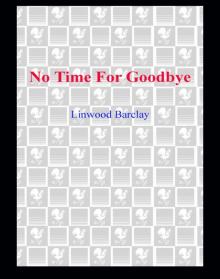 No Time for Goodbye
No Time for Goodbye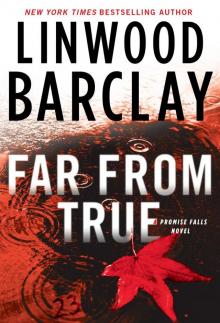 Far From True
Far From True Lone Wolf
Lone Wolf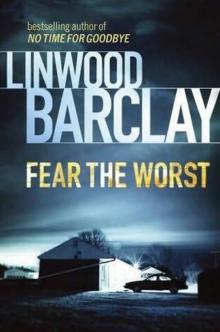 Fear the Worst
Fear the Worst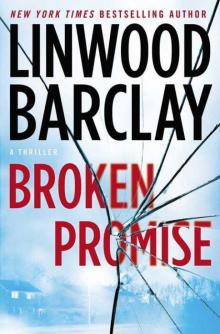 Broken Promise
Broken Promise A Tap on the Window
A Tap on the Window Parting Shot
Parting Shot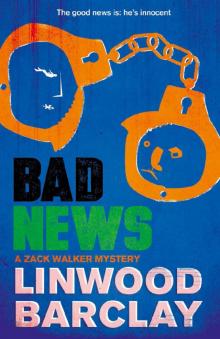 Bad News
Bad News Too Close to Home
Too Close to Home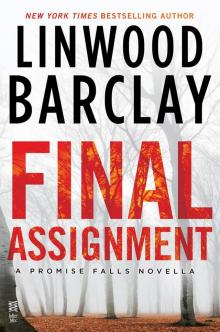 Final Assignment
Final Assignment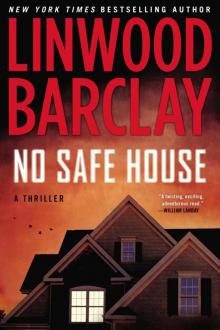 No Safe House
No Safe House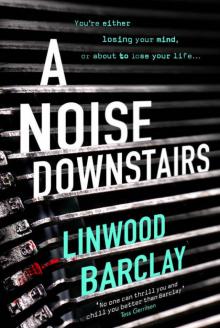 A Noise Downstairs
A Noise Downstairs Bad Guys
Bad Guys The Accident
The Accident Stone Rain
Stone Rain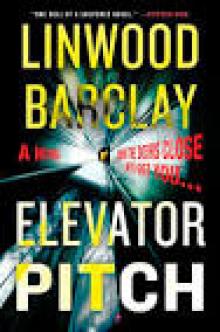 Elevator Pitch
Elevator Pitch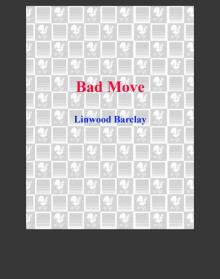 Bad Move
Bad Move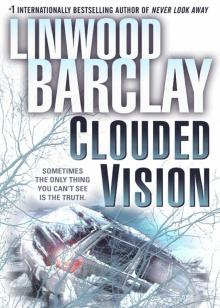 Clouded Vision
Clouded Vision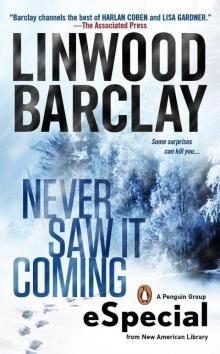 Never Saw It Coming
Never Saw It Coming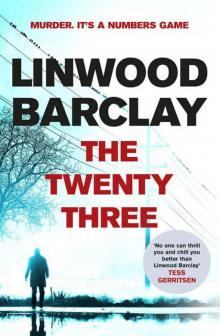 The Twenty-Three
The Twenty-Three Find You First
Find You First Never Look Away
Never Look Away Elevator Pitch (UK)
Elevator Pitch (UK)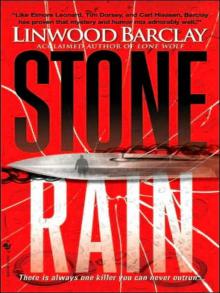 Stone Rain zw-4
Stone Rain zw-4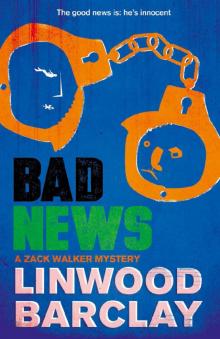 Bad News: A Zack Walker Mystery #4
Bad News: A Zack Walker Mystery #4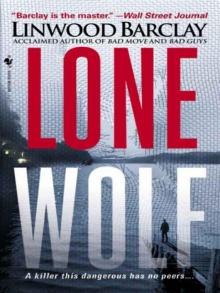 Lone Wolf zw-3
Lone Wolf zw-3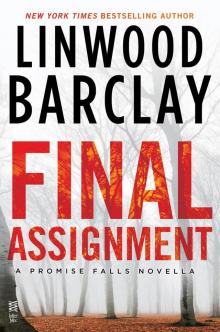 Final Assignment: A Promise Falls Novella
Final Assignment: A Promise Falls Novella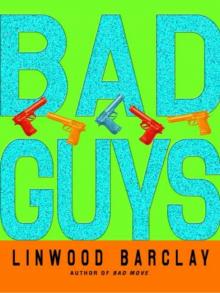 Bad Guys zw-2
Bad Guys zw-2 Never Saw It Coming: (An eSpecial from New American Library)
Never Saw It Coming: (An eSpecial from New American Library) Never Look Away: A Thriller
Never Look Away: A Thriller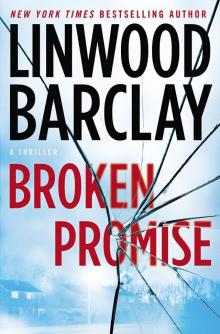 Broken Promise: A Thriller
Broken Promise: A Thriller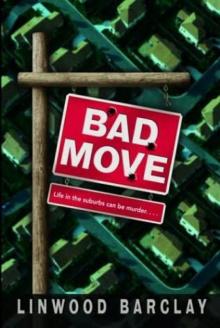 Bad Move zw-1
Bad Move zw-1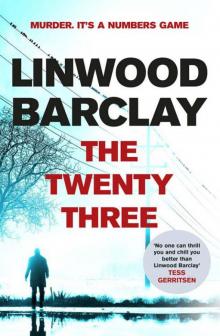 The Twenty-Three 3 (Promise Falls)
The Twenty-Three 3 (Promise Falls)